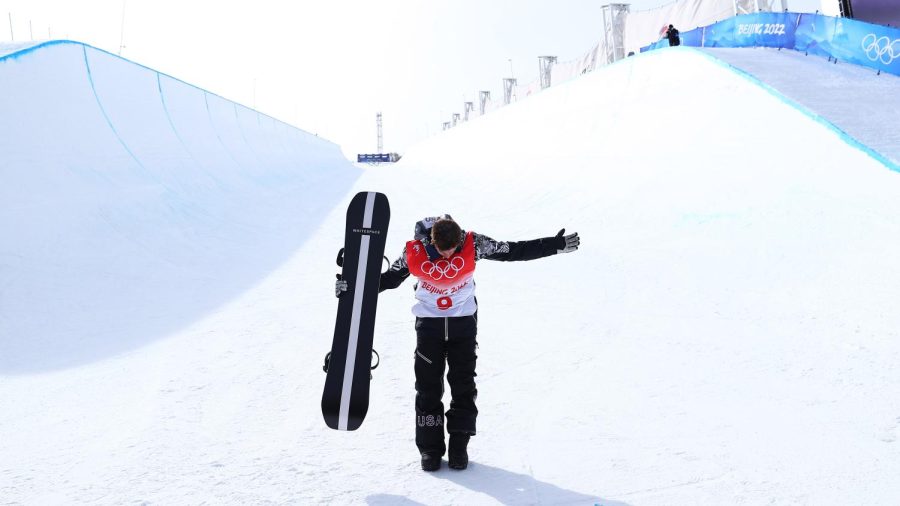Shaun White’s Legacy on the Halfpipe
February 21, 2022
Snowboarding legend Shaun White is putting his board away at the age of 35, after his 22-year-long career as a professional snowboarder. In November of 2021, he decided that he was going to retire after the 2022 Beijing Olympics.
On Thursday, February 10, White competed for the last time in his fourth Olympics. Competing in the Men’s Halfpipe Finals, White scored 72.00 on his first run after a wobbly landing, putting him in fourth place. On his second run, he scored an 85.00, keeping him in fourth. On his third and final run, it was ‘go big or go home,’ and he started off strong before falling on one of his 1440s. That moment was the end of snowboarding for him, but he didn’t leave the halfpipe in anger and regret. He stood up, took off his helmet, and held it up to the sky. Soaking in his final moments on the Halfpipe, he snowboarded down to the bottom with the sound of a roaring audience echoing around him. He was met with hugs from his competitors and a continuous stream of applause.
The impact White had on the snowboarding community is immeasurable, and he has shown countless aspiring young athletes that they can do anything. He was overcome with both gratitude and sadness. Even though his score was not enough to place him on the podium, White will forever be remembered as a snowboarding champion. His lack of a medal at this year’s Olympics in no way overshadows his unbelievable career and all of his achievements.
When White was younger, he followed his brother to the YMCA one day and picked up a skateboard. That skateboard turned into a snowboard, and by the time he was six years old, he was always snowboarding.
In 2006, when White was only 19, he appeared in his first Olympics. The games took place in Turin, Italy, and White left with his first gold medal in the Men’s Halfpipe. He was nicknamed the “Flying Tomato” due to his long, curly red hair.
White returned to the 2010 Vancouver Olympics where he won his second gold medal. After his first run on the Halfpipe, he had already secured gold, but continued nonetheless and ended with a 48.6/50.
He appeared yet again in the 2014 Sochi Olympics. White landed in fourth place in the halfpipe competition, falling short of a medal. Prior to Sochi, he was training and attempted a triple cork (three diagonal flips) but failed to land it and smashed into the top of the halfpipe, sending him to the hospital. He never ended up landing the trick in competition, but he brought snowboarding to a new level by taking major risks that encouraged athletes all around to attempt difficult tricks.
After Sochi, next up were the PyeongChang games in 2018. In 2017, White had another serious injury on the halfpipe that required him to get 62 stitches. He took time to heal and fortunately was able to qualify for the Olympics. Despite any injuries or setbacks he faced, he kept pushing on and was a force to be reckoned with. He went on to earn his third gold medal that year, after he landed two 1440s back-to-back, earning him a 97.75.
In addition to his Olympic success, White has also earned 18 medals from the X Games and ten individual World Cup podiums. He is parting with the sport as not only a heavily decorated competitor but also as a snowboarding legend.
In December 2021, after he had announced he was going to retire, he said, “It is one of those things where I have accomplished so much. I think it would be a different story if I had come close to the gold four times and this was my last chance… Having such a long and amazing career, now at this point in my life, I can go back and go ‘Wow, it’s been incredible’” (People Magazine).
He also said, “I can’t wait to see what the next generation does with this sport. Look at where it’s come” (Los Angeles Times). White is one of the largest reasons, if not the reason, that the sport has come so far. He raised snowboarding to a new level, motivating snowboarders to conquer the halfpipe.
White has opened up opportunities for other snowboarders. He said, of Olympic gold medalist Ayumu Hirano who just won gold in the Men’s Halfpipe, “Everybody was asking me what my legacy in this sport has been. And you’re watching it. [The other men competing now have] been on my heels every step of the way and to see them finally surpass me, is I think deep down what I always wanted: to be beaten… [Hirano’s] triple [cork] was incredible. It was the biggest air of the day. I know [he] wanted it. It’s his time” (Los Angeles Times).
White’s teammate Lucas Foster said that White put snowboarding on “the train that it’s on” (Los Angeles Times).
The weight of his legacy weighs heavily on the shoulders of other snowboarders, globally.
Not only will young snowboarders look to him for inspiration but also to replicate his technique and possibly his signature move – the Double McTwist 1260 (540-degree rotation and two front flips).
After his final run at the Beijing Olympics, he said, “A lot of emotions are hitting me right now — the cheering from the crowd, some kind words from my fellow competitors at the bottom. I’m so happy… Snowboarding, thank you. It’s been the love of my life” (NPR).





Cessa Lewis • Mar 11, 2022 at 9:54 am
Awesome article, Abbs!